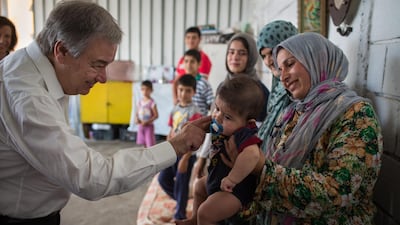Safety on returning home, lack of education and minimal psychological support are the greatest concerns among Syrian refugees in the Lebanese town of Arsal, a report found.
The Syria Then and Now report published on Thursday focuses on the town in the mountain range that separates Lebanon and Syria.
Arsal is one of the poorest towns in Lebanon and the high altitude makes it particularly cold in winter.
It is also where some of the poorest and most vulnerable refugees have ended up. The town has a Syrian refugee population of about 65,000.
Many refugees there believe they will not be able to return to Syria safely, with the political situation worsening and completely different to what it was before the war.
But all of the refugees to whom Human Appeal spoke in the camp expressed a desire to return.
“Assurances for the safety of Syrians who want to return need to be met," the report said.
It said there should be international scrutiny of the return process, "with clear and effective repercussions if their safety is breached".
Education is also a priority for Syrian refugees in Arsal. Among parents, there was a shared concern for the quality of education in the camp and how it would affect their children’s futures.
Those educated in refugee camps tend to have less academic success than other Syrians, Human Appeal said.
The effects of trauma were apparent in the camps, with children were most psychologically vulnerable to conflict.
“While NGOs provide limited psychosocial support to the refugees, it will take a long time to heal the mental wounds,” the reported said.
“More support needs to be given to help care for those who are still struggling to cope with the burden of the horrors they have experienced.”
Ghadeer is one of two widows living in a cramped tent of eight people in Arsal. Her youngest child is 10, her oldest is 16.
Human Appeal found that Ghadeer’s children, who were also staying in the tent, suffered from terrible psychological trauma after witnessing killing and losing their father, who was gunned down with 17 others.
Since the start of the Syrian civil war, nearly half of the population has left the country or died, the World Bank Group says.
The death toll from the war is estimated to be as high as 560,000. More than 6.5 million people have been internally displaced and 5.3 million have fled Syria as refugees.
The conflict has meant many Syrians have no access to health care, education, housing or food, sending millions into unemployment and poverty.
The war has ravaged the Syrian economy, which now has one the highest rates of hyperinflation in the world, the Central Intelligence Agency says.

